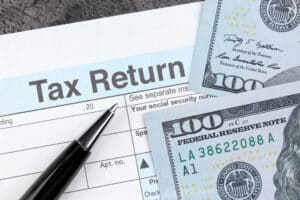Tax Filing 101: How To File Taxes As A US Expat

Expats who live and/or work in a country other than their home country generally do so temporarily and often for work purposes. US expats must still file their tax returns in the US even if they become liable to tax in the new home country. This guide sets out how to file taxes as an expat.
Expats: Do They Have to Pay Taxes?
Most expats can completely erase their US tax payment by taking advantage of the IRS’s unique tax credits and exclusions for Americans living overseas, designed to help expats avoid double taxation. Even if you don’t owe any taxes, expats who earn more than the filing threshold must file a tax return in the United States.
Regardless of where they reside or work, all American citizens are compelled to submit and pay US taxes on their worldwide income. As a result, expats are frequently required to file and pay taxes in the United States and their home country.
It might be tough to navigate the filing procedure due to the special tax rules and requirements that apply to US expats. Thankfully, this checklist of essential information will provide you with all you need to handle your US expat taxes confidently. For more detailed information you can also visit a blog site about taxes https://turbotax-2012.org/.
When To File Form 8833 – Tax Treaty?
Every American living abroad should be aware of the tax treaty between the United States and the country in which they reside. Otherwise, they can utilize specialized US expat tax software that takes advantage of tax treaty benefits!
The majority of tax treaties specify which country has tax rights on various sorts of income, such as:
Benefits from Social Security
- Pension Payments
- Royalties
- International tax treaties can even specify how US citizens living overseas are taxed on their capital gains.
There are many tax software that provides the IRS with the following information on Form 8833, Treaty-Based Return Position Disclosure:
- What tax treaty is being used?
- The tax treaty’s specific provision
- Describe the treaty-based return position, such as income is tax
Your Social Security Benefits – Extended
A Social Security Number is required for filing taxes. If you don’t have one, gain some insight into the necessity of obtaining an SSN.
A Social Security Number follows you for the rest of your life and ensures that the Internal Revenue Service properly records your tax returns.
Your Travel Document
If you are behind on your taxes, the IRS has the authority to revoke your US passport. But don’t worry; this should only happen if your tax obligation exceeds $51,000. You can avoid this worst-case scenario by claiming the correct expat tax benefits and submitting them on time.
Your Bank Account in a Foreign Country
The IRS wants to know how much money you’re making as a US expat living abroad. It entails the quantity of money in your overseas bank account, how it got there, and whether or not your income has generated any money through capital gains and/or interest.
The FBAR and FATCA are two distinct reporting requirements that will be handled for your overseas bank account as part of the US tax rules for citizens living abroad.
The FBAR (Family Business Accountability Report) is
If the total value of overseas holdings exceeds $10,000 at any point during the tax year, one must file the Foreign Bank Account Report (FBAR). This includes any non-US accounts on which you only have signature authority.
The FBAR is a federal tax form that must be submitted online using FinCen Form 114. This document is associated with the Department of Treasury (rather than a foreign government) and must be submitted by the annual tax deadline of April 15th. However, US expats have an automatic extension till October 15th to complete this task.
This is different from completing Form 1040, so make sure you fill out both forms if you need to submit overseas taxes. Additionally, when reporting your overseas bank account income to the IRS, you must use Form 8938.
Some Common Expat Tax Filing Mistakes
The most common mistake made by US expats is failing to file their tax returns.
- In your expat tax return, include Form 2555 or Form 1116
- Claim the extra child tax credit
- After June 15th, submit a request for an extension
- File an FBAR with your tax return
Even when using expert US expat tax services, some of these errors can occur. Because of its popularity and convenience of use, most tax firms will use Form 2555 instead of Form 1116 even if families living overseas are eligible for a refund of up to $3,600 per qualifying child under the Additional Child Tax Credit.
Another mistake that Americans living overseas and accidental Americans can commit is not reporting their US taxes. This, like the ones mentioned above, is a fixable error. Those who have not filed their US taxes can take advantage of the Streamlined Filing Compliance Procedure, a US expat tax amnesty scheme.
In the end, make sure you deal with your tax payments with utmost sincerity and carefully, avoiding any discrepancies and accidental fraud.